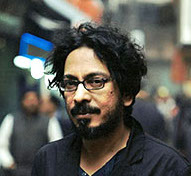Sarnath Banerjee
(b.1972)
Sarnath Banerjee did an M.A in Image and Communication, Goldsmiths College, University of London in 2003. Sarnath Banerjee had written four books of graphic fiction, Corridor, The Barn Owl’s Wondrous Capers, The Harappa Files and All Quiet in Vikaspuri and recently Doabdil. As part of his ongoing project involving collaboration with historians, Banerjee had produced Liquid History of Vasco Da Gama for the Kochi Biennial, 2014, and The Poona Circle, a series of vandalised history textbooks, for the Pune Biennale, 2017. The same year, for Frans-Hals museum, Harlem, he produced I Got Ginger, 2017; a series of drawings and text that proposes the making of an “insubordinate” children’s book on Dutch colonialism. His billboard series, Gallery of Losers, commissioned by Frieze Projects East, for the 2012 London Olympics, was widely displayed in East London. In 2016, he was commissioned over 80 murals by Deutsche Bank, for their new office in Canary Wharf 2008. Banerjee co-founded the award-winning publishing house Phantomville that brought together reporters and comic-book artists to produce works of visual journalism. He also had a column, The Enchanted Geography, for a national newspaper in India.
For years Sarnath Banerjee has examined the various intrigues of the Indian middle-class and their relation to modernity, therefor, remote highlands and its ancient myths is somewhat out of character for him. However, in 2013 summer, Banerjee spent a few weeks in Inverness and worked at the Highland Print studios where he experimented with lithography and screen-printing. During this time he would go for extensive solitary walks through the glens, often during the night (although there were no proper nights) through evocative, remote and sometimes chilling landscapes. Often, he found himself sitting in pubs, situated at the “edge of civilisation” drinking whiskey, chatting to local characters, collecting folklore and myths and discussing the Scottish referendum. These uncanny prints are the material products of this journey, which over the years have affected the way Banerjee thinks about his work.


